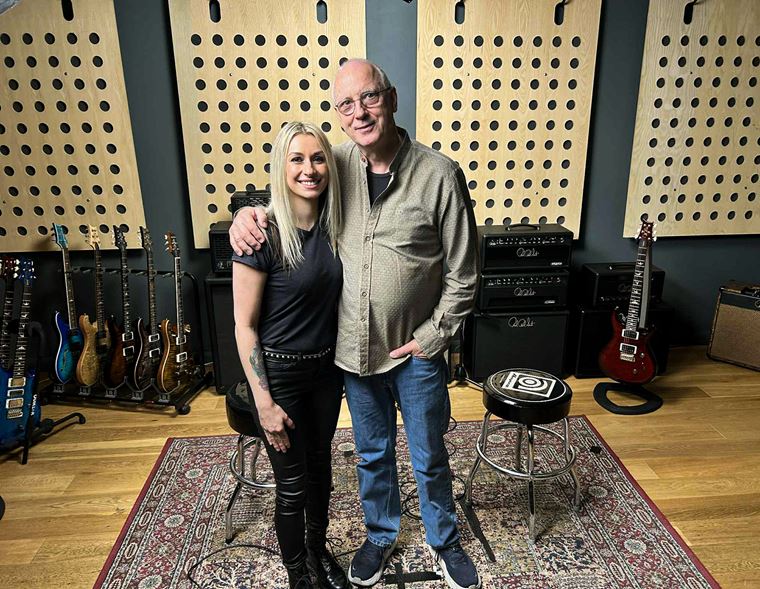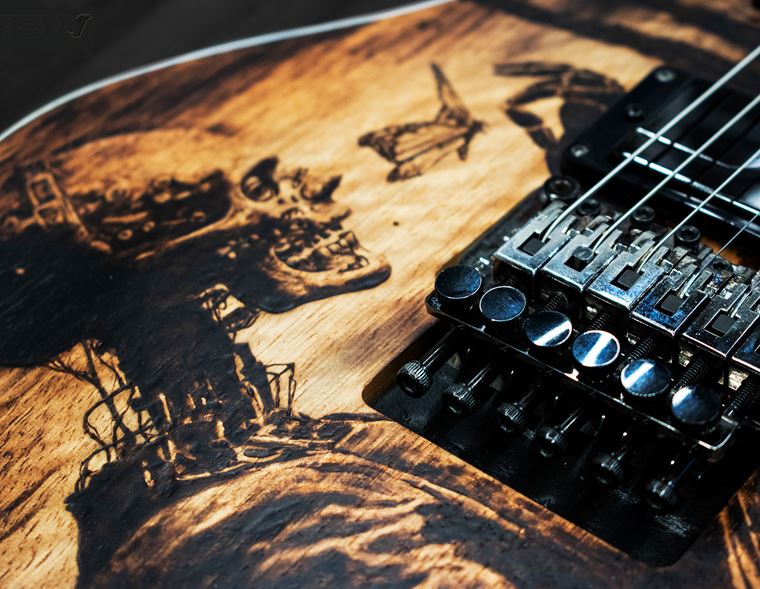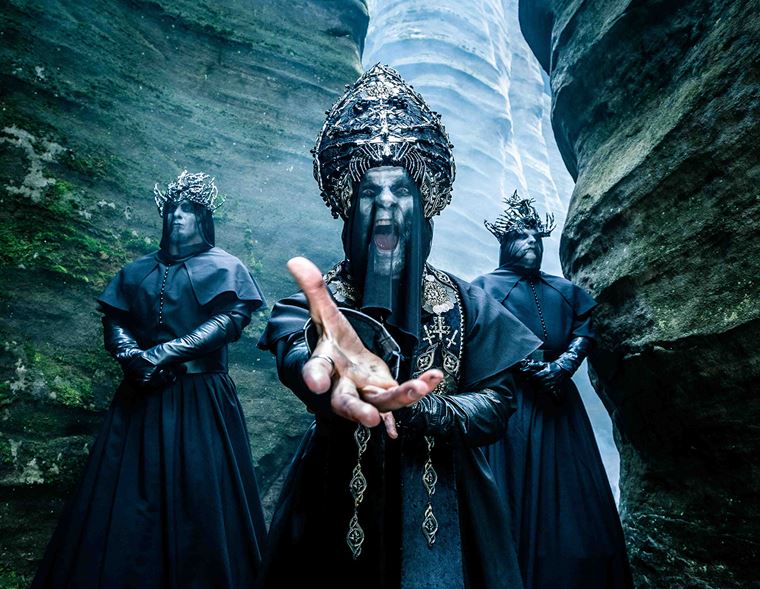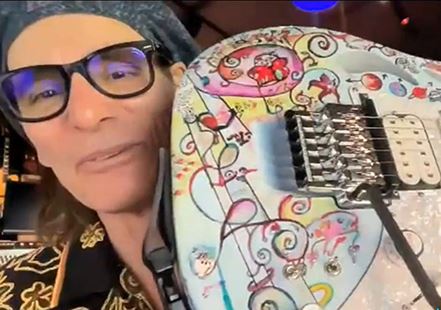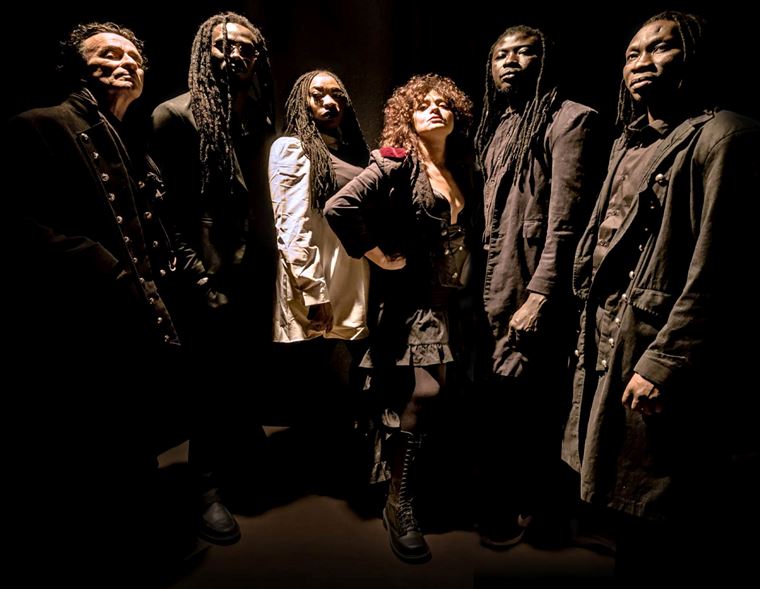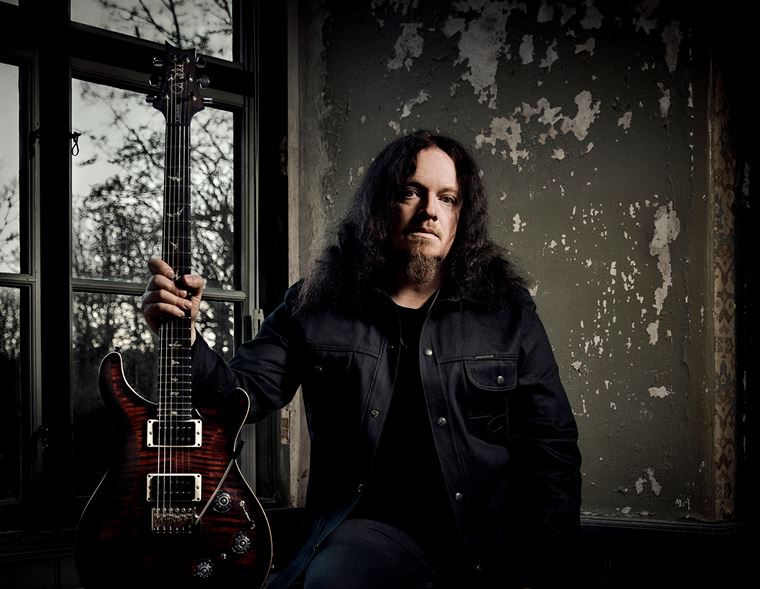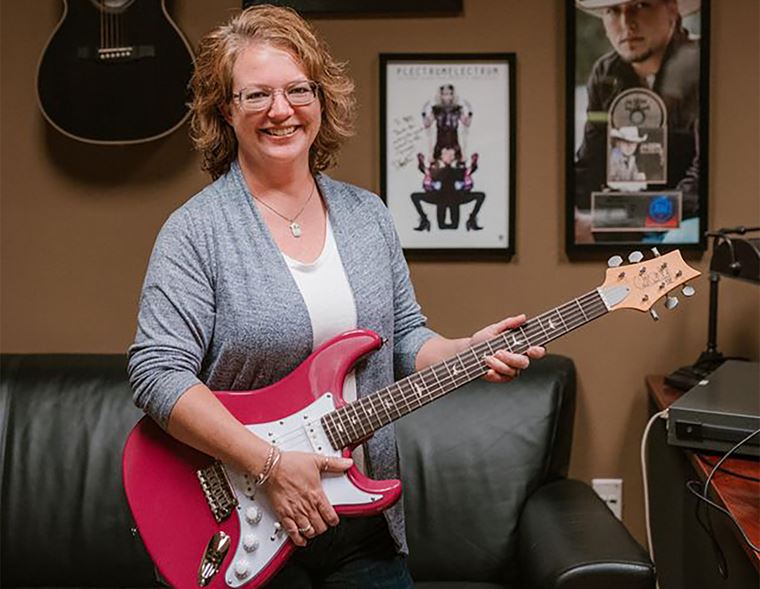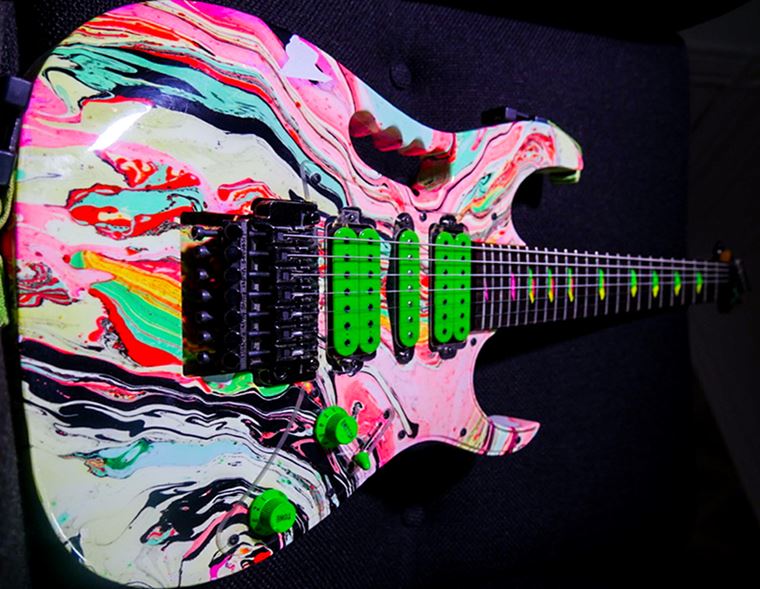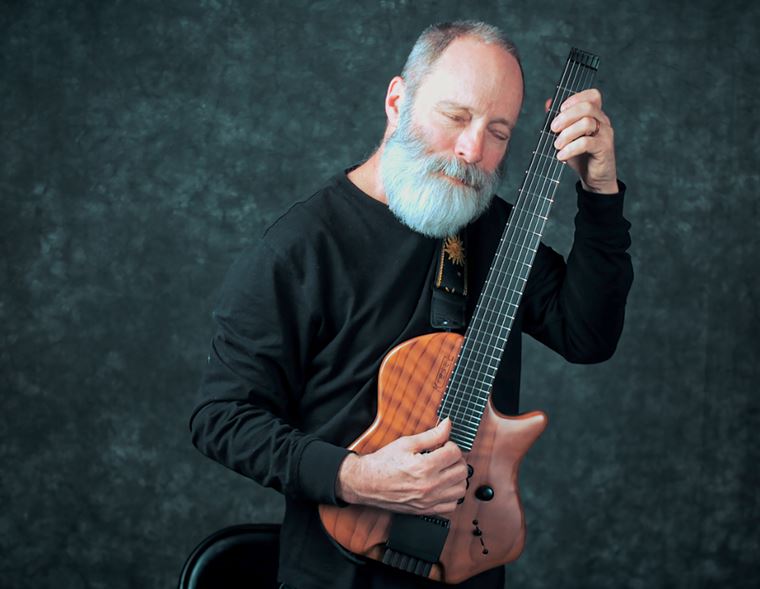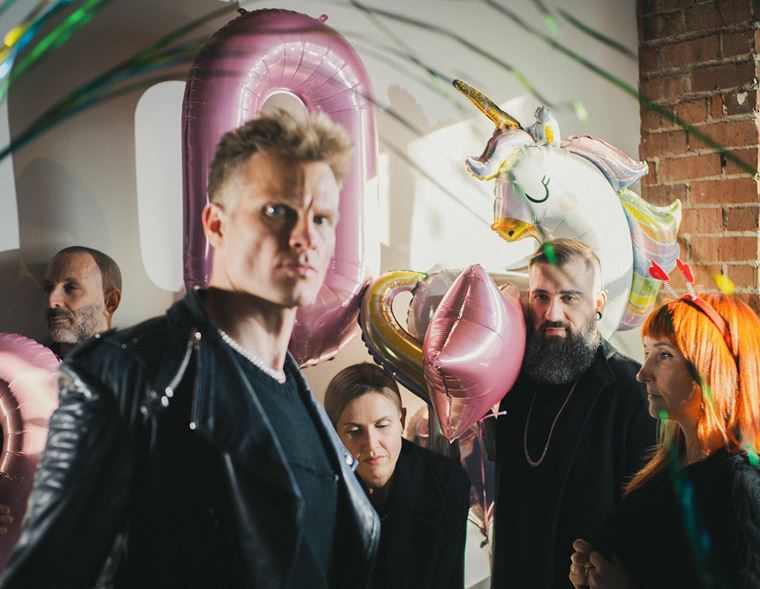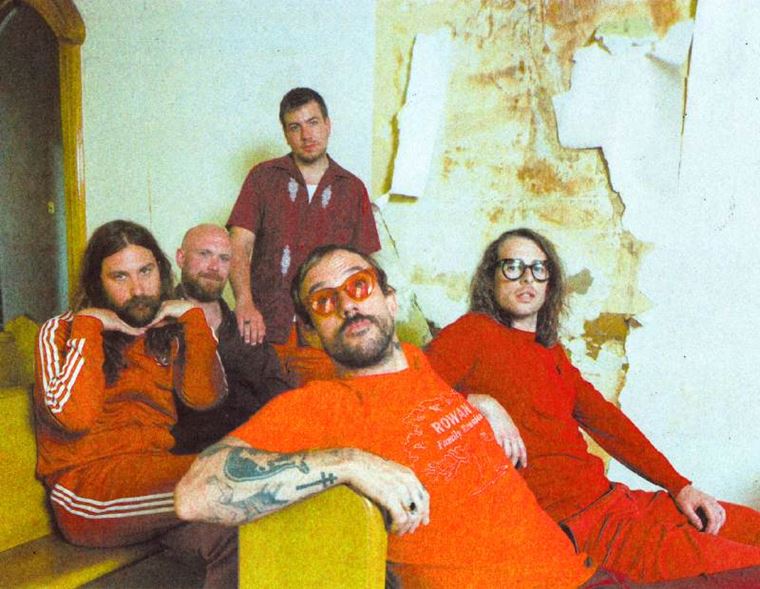LORD HURON: Ben Schneider Talks to guitarguitar!
UFO’s. Cowboys. Faded Movie Stars and Crooners from the wrong side of the road. All these characters and more reside within the creative world woven by Lord Huron. Taking the collective mythology of 20th American history and blending it with timeless songwriting, Lord Huron have, over the space of 4 albums, built up a musical locale that’s rich in emotion and richer in atmosphere.
You may remember their song The Night We Met from the Netflix drama series 13 Reasons Why. There’s a good chance you’ve heard it, since it has, at time of writing, accrued over 760 million streams! Not bad for a band who, by their own admission, ‘aren’t much of a radio band’!
We recently had the good fortune of being able to jump onto Zoom and (virtually) whisk ourselves to Los Angeles to speak to Lord Huron’s lead singer and principal songwriter, Ben Schneider. Laid back, cool and very pleasant, Ben was a friendly and engaging interviewee. We covered areas like the imaginative concept behind the forthcoming record Long Lost, the richness of simple songwriting, and the joys to be found in juxtaposing creative elements from different time periods. I learned everything I’d hoped to learn, and a lot more besides!
guitarguitar: Ben, how are you doing?
Ben Schneider: Hey! Good, how are you doing?
GG: I’m good, thank you. How has the whole pandemic situation been for you?
BS: Uh, interesting, you know? We were just kinda finishing the record when it hit and yeah, it definitely changed our plans a little bit but, you know, I feel lucky that we weren’t supposed to be on the road much. I’ve got a lot of friends who rely on that for their income, and they were supposed to be touring all year. It’s just like...what do you do? It’s really a bummer. But things are slowly starting to reopen here now. I see the light!
GG: Okay, cool man! Yeah! So, I’ve been giving your new record, Long Lost, a good listen. There’s so much I want to ask you about it! It evokes a lot of things, let’s put it that way. Shall we dive in?
BS: Sounds good!
GG: So, you said you were just about finished recording it when the first lockdown occurred. Were you guys on schedule to be making the record last year regardless?
BS: Yeah, so we started recording in late January 2020 and for the first time, we’ve had the luxury to record live as a band. We generally do a lot of overdubbing, but this time, the core band was able to rehearse and then record live, which was really exciting for us. It’s a very orchestrated record and we kinda had dreams of doing Pet Sounds-style sessions, you know, with everybody in the same room. Unfortunately, because of the pandemic, we couldn’t get all those people in – all those string players – to be with us at the same time, so we had to rethink that a little bit. That’s really the biggest impact it’s had. We weren’t able to do that the way we’d originally foreseen, but you know, that’s how it always goes, man! Making a record is never the way you expect it to be, at least in our experience! It was still a really great experience and, like I said, not feeling like we had to get on the road right away was a huge help.
"The concept behind it was kinda that we wanted it almost to sound like a long-lost classic from another dimension"
GG: Oh yeah, totally. And that’s interesting that you bring up Pet Sounds. Long Lost is such an atmospheric album. I don’t know how much of it is just from the sonics, because you guys have made this brilliant campaign around it too: I’m gonna ask you about mysterious guys like Tubbs Tarbell (Ben laughs) and I’m gonna ask you about Whispering Pines, because the phrase ‘whispering pines’ was familiar to me, somehow. Then I heard the first tune on Long Lost and thought, ‘Wow, that sounds like The Band!’ Now, of course ‘Whispering Pines’ is a Band song, so I’m like ‘Okay! Okay! We’re getting onto something here!’ Which I’ll come back to in a second, but from listening to the record – and it won’t be out till May, so I don’t want you to spoil anything on my behalf if you don’t want to say anything – but is there an overall concept at play here? Is there a storyline in mind? You have all these cool little tracks of spoken word and so on.
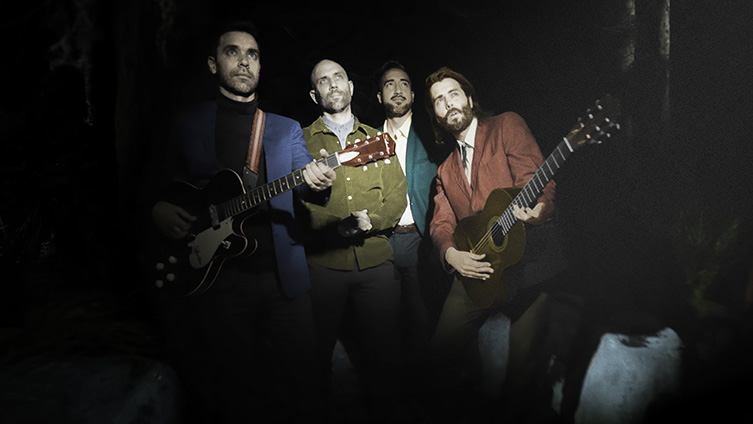
(Photo: Anthony Wilson)
BS: Yeah, so the concept behind it was kinda that we wanted it almost to sound like a long-lost classic from another dimension. It’s like a record you somehow missed: it sounds familiar, but you can’t quite figure out why. It’s nostalgic in a way that you can’t quite put your finger on. It’s almost like you missed it, or it dropped from outer space from some other dimension. It all started from our studio - which is called Whispering Pines - where we’ve been working for the past seven years, done our last three records there. It’s an old studio, built in the early 70s, a beautiful old space, you know, they really don’t make ‘em like this anymore. Huge tracking room, glass control booth. But, when we got it, it had been abandoned for about 20-25 years, so there was all this outdated equipment there that we had to tear out and rebuilt.
We’ve always been kinda curious about the history of the place, but there’s no historic registry for this building so we don’t know exactly what’s gone on in there. We know a few people who’ve worked there. So, we kind of started inventing it and we started channelling that for this new record. I don’t know, I find it really useful to put myself in other people’s shoes by creating characters, sort of just to write songs through. So, we had this idea that there were all of these artists who had moved through Whispering Pines, these sorta hard luck showbiz people who’d come and gone through this studio. We just created these characters and started channelling them for song ideas. That’s the theme that runs through the record: it’s supposed to feel like these songs originated with these characters and the story of their lives.
"We just created these characters and started channelling them for song ideas. That’s the theme that runs through the record"
GG: Interesting! What you initially said there about it almost being like a nostalgic record that maybe you missed, but is somehow familiar, is exactly what I was getting from it. Did the spoken word ‘promo’ bits come later on in the process?
BS: No, that’s been going since the beginning. I do think it’s interesting that some people will be interested in that backstory, but I can understand how it could come off as a little, you know, cagey or pretentious or something. So it’s just about trying to dial the knobs in the right way so it still makes sense and is appealing to people.
GG: Yeah, well the good news is, I understand that a concept can be seen as a pretentious thing – which is silly, because what artist doesn’t ‘pretend’ when they are creating? – but the music that you write is very unpretentious. It’s classic songwriting. Presumably you’re a fan of The Band? I can totally hear it in there, like the ghost of The Band, but there’s also Roy Orbison and others. Were you going for timelessness with the writing?
BS: Yeah, I mean, I think a lot about those old characters, those real characters from the past, and just...yeah, the larger than life feel that a guy like Roy Orbison has. For me, a big one is Lee Hazelwood. He’s kind of getting his due now but he’s been a bit of an overlooked titan for me in terms of songwriting and production. I just love what he does, and the world he created. And yeah, I love The Band, but it’s funny cause the way the name for the studio came about is actually from a Johnny Horton song, not from The Band.
GG: Oh, okay!
BS: Check that song out, it’s also a really great old Country song.
GG: Nice!
BS: But yeah, we definitely try to channel that feeling. All of that emotional feeling you get from a guy like Roy Orbison, it’s like, we’ve found it’s useful to reference that because you get that stuff for free: you get all those attachments people have to other artists without having to, you know, do all the work in some ways! Just by evoking them. We found that to be really useful because it’s almost like an emotional shorthand: it’s a way to get to feelings faster.
GG: And not only that, for people our kind of age, we grew up hearing Roy Orbison in the context of David Lynch films and things like that, so there’s already this extra, ‘other’ relationship with these old artists. I’m not sure if you’re a David Lynch fan, but I’m getting a huge Twin Peaks vibe from Long Lost! Even the instrumentation, particularly the baritone guitars, suggest that 'otherness' within Americana that reminds me so much of Lynch, Mark Frost and Twin Peaks. They used a 1950s/1990s anachronism, whereas your record is kind of ‘post-history’, as it were! Is that type of thing part of your creative shorthand too?
BS: I think so. I think that maybe what we have in common with that stuff is that sort of collapsing of eras, like you were saying. Rather than having a linear view of time, it’s just this kind of superimposed, overlaid, blurred picture, that’s how I think of time. And yeah, we’re just big fans of letting that stuff lay on top of each other, almost like picturing everything that’s gone on in a room at once: all the people who have been there and all the things that have happened there, all happening at the same time. We’re not afraid to be anachronistic or to make strange combinations, you know? The 80s can sit right next to the 50s in our world and it feels good: there’s a good rub that happens, I think, when those things fit together.
The surreality of David Lynch’s stuff and just the...he does a really nice job of evoking a sense of nostalgia but in his own world, in his own context, and I think that’s similar to what we’re doing in a lot of ways. Definitely the undercurrent of creepiness (laughs) is something we always try to maintain, too. Humour too, just all the things we like, all mixed together.
"Lee Hazelwood is a bit of an overlooked titan for me. I just love what he did and the world he created"
GG: Yeah, certainly! Atmosphere is something I’d like to get back to, because it’s really prominent in your recordings. There are lots of keyboard sounds and synth sounds, which are again, sort of timeless or retro sounding. There’s the patina of age about them. Was that deliberate?
BS: Yeah, and I think a lot of that, too, is to do with our recording techniques and the equipment we use, you know? I mean, on this record in particular, we really tried to use as much analog gear as we could, and to record as much stuff live as we could, to give it that, as you said – patina – that’s impossible to fake, I think. I mean, there are many ways to fake it, but nothing beats the real thing. Even the way we mixed, we used a guy named Paul Butler, who just has a real knack for that sort of stuff and has a great stable of gear to use, in terms of processing everything and giving it that aged feel. That all adds to the atmosphere.
To us, every choice is deliberate, because it all adds up to something. Letting synths and more modern stuff live next to a fifties baritone guitar is when I think you start to get some exciting moments. We never wanted to be strictly a throwback or anything, I don’t think there’s much interest in that, to me anyway. But like I said, it’s great to use those reference points and build off of that to make something new, something fresh, and take it into a realm that’s your own, that feels impossible to define, somehow.
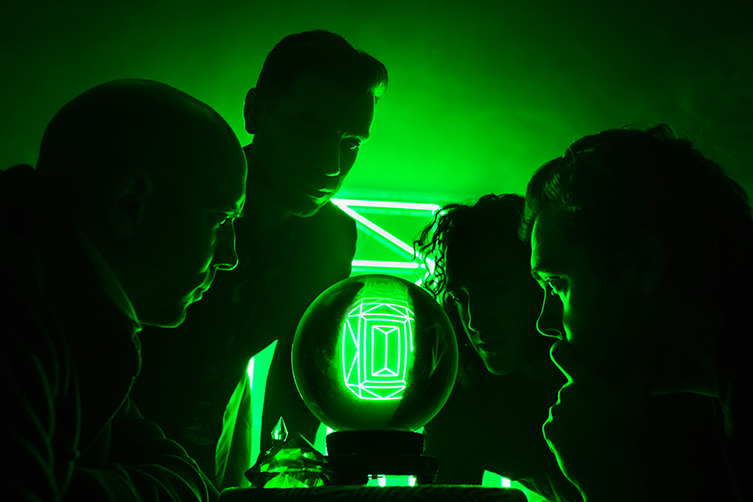
GG: Yeah! That’s why we need the music to do it for us! The song Long Lost has a really sweeping string thing: is that actual string players or is it done on keys?
BS: No, all the strings are real. We were only able to get a couple of songs done at our studio before the pandemic hit, and so the rest were recorded with a friend of mine in Sweden, who has a studio and some string players. I’m lucky in that one of my best friends is a really accomplished string player and arranger. He helped me with the arrangements and got some great players together. It’s just so much fun watching all that come together, you know? Starting from hearing that in your head and then having it come to life like that is really an incredible feeling, especially when it’s as epic as in that song.
GG: Yeah, it’s beautiful!
BS: Thank you.
Writing
GG: No problem! So, who plays the keyboard instruments?
BS: We have a keyboardist in Misty Boyce, who tours with us. We can’t do everything we do on the record live, so we try to condense it as much as we can. For strings we use mellotron string sounds, which are really beautiful old samples, but yeah, we kinda have to do something different for the live show. The plan for this – and we’ll see when we actually get to go out and tour it – is to try to have a full chamber group backing us up. For certain engagements, for bigger shows. I really hope we still get to do that because in addition to the strings, we had some really beautiful backup singers join us with these beautiful operatic voices: the old Roy Orbison-style backup vocals. I hope we get to do it because it would be incredible to do a live show like that.
GG: Oh, it would feel great! So, in terms of the writing phase, presumably you’re the primary songwriter? If fact, Lord Huron started off as a solo project, right?
BS: That’s right yeah. I’m still the main writer.
"We've always been kinda curious about the history of Whispering Pines, but there's no registry for this building, so we don't know exactly what's gone on in there"
GG: Okay. In that case, when we’re talking about these big epic soundscapes, do you sort of go to a computer and use some plugins to do like a temporary version, then give it to someone else? Is that how those things are written?
BS: Yeah, basically yeah. I’ve got a pretty extensive demoing process. Usually by the time I take stuff to the band, I’ve got a pretty good idea of how I wanna produce it and what all the instruments are. They, being very creative and accomplished musicians, take it to the next level, adjusting their parts and making suggestions. I generally try to play stuff using computer voices, MIDI voices to get the idea down and then have people re-record it. If I’ve got the luxury, sometimes I’ll sent it to my string player friend and have them demo it up for me, just so I really hear how it sounds, but it’s pretty amazing, some of these programs nowadays. There’s some really nice string sample libraries and stuff that you can leverage to get your idea down.
GG: Oh yeah. Are you using Kontakt? Like, Native Instruments?
BS: Yeah, Spitfire is the one I’ve been using, on Kontakt, yeah. It’s got all the portamento and slides, vibrato and stuff. You can really get expressive with it. I’m experimenting with using expressive controllers with it as well. I’ve got this thing called the Linnstrument, which is an interface with a big grid of little rubber buttons, and it’s got expressive control, so you can do vibrato and pitch bend and all this cool stuff.
GG: The Linnstrument? As in, Roger Linn?
BS: Yeah! Check it out. There’s a few things out there now: there’s a keyboard called the Continuum which is really cool. It has that sort of stuff and that’s just a traditional keyboard layout. The nice thing about the Linnstrument is, you can lay out the buttons however you want, so one of the defaults is a guitar, which is easier for me to think about. It’s really intuitive for a guitar player to mess around with.
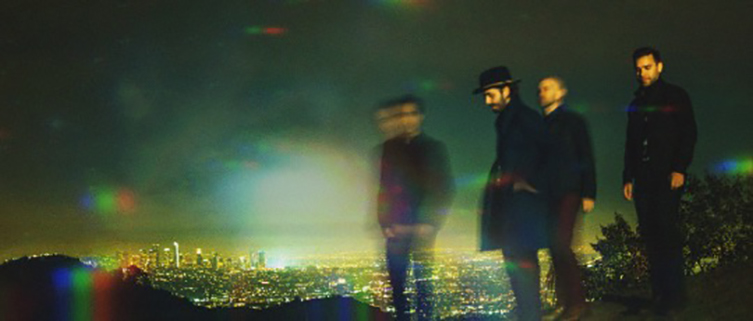
GG: That sounds really interesting, I’m into that! Just before we leave the subject of keyboards, you have that amazing, long track at the end of the album, Time’s Blur. Given what you told me about how you are kind of a keys player but not really, how did that piece of music come about?
BS: So that was the one result of the pandemic, I guess. When I was stuck at home, I started working on that. The way I made that was, it’s the string parts we’d recorded, I’m just manipulating them with tape machines and with digital timing: stretching them out, reversing them, so it’s all stuff from earlier in the record. The idea of that song is that you’ve heard this in this Long Lost record and now here’s the sort of effect time has on our memories, so it’s almost like it’s a blurring memory of the record as this long ambient track at the end. So, it’s actually all bits you’ve just heard, stretched out, chopped up and re-arranged into this sort of more abstract piece.
GG; Wow, that’s incredible! I wondered, on a couple of occasions, whether I recognised the odd chord change here and there! I wondered if you were quoting something from earlier but it’s directly the same music!
BS: Yeah! I had the strings recorded in Sweden and I was getting those files in and had to wait because we weren’t ready to mix yet. I just kinda had them sitting there and I thought, ‘What can I do with these?’ Sitting around in my robe and I was like, ‘fuck, let’s dig in and see what we can make outta this!’
GG: What else are you gonna do? Haha!
BS: Yeah! It ended up being really satisfying and I’m really proud of that piece, in terms of the record. That’s one of my favourite moments, so I’m really glad that happened.
"The 80s can sit right next to the 50s in our world and it feels good: there's a rub that happens, I think, when those things fit together"
GG: It’s a big surprise at the end of the record as well. We go through all of the songs, which are kinda of classic songwriting, and then this Brian Eno epic shows up at the end!
BS: Haha, yeah!
GG: So, there are no keyboards there? It’s all you digitally manipulating real life strings?
BS: Yes. Strings, voices, a lot of it’s those backup singers, some guitars, I mean, just any of the stems we had from other songs. I’m pretty sure none of it is keyboards, it’s all either strings, voices or string instruments.
GG: That is so creative! I was gonna ask what kind of plugins or whatever you used, because I wanted to go and have a shot of that sound, but that’s not really gonna happen now, is it? Haha!
BS: (laughs) Yeah, I was amazed at how cleanly – I mean, nothing beats slowing stuff down on the actual tape machine – but I did some of it with digital slowing down and I couldn’t believe how clean they’ve got sounding now. It used to be, when you slowed things down digitally, it sounded like you could have all the ‘bits’ and everything. Now, it’s beautiful.
GG: Now, I’m going back a few years now, but there was that program Paulstretch. Remember they would do things like Lana Del Rey slowed down 7000 times...
BS: Yeah!
GG: I think they dither the digital signal so that those ‘bits’ are less jaggy.
BS: Right, they soften all those curves.
G: They soften all those curves. That’s it. So, is that similar to what you were using to do your slowing down?
BS: Yeah, the main one I was using is built into Logic now, it’s a thing called Varispeed. It gives you the option to slow down and not change the pitch, or to slow down and change the pitch, so it’s kinda cool. It’s very versatile. Then, I just have a coupla tape machines, Tascam, that you can slow down. That sounds great, too.
GG: Is that like the old Portastudio kind of thing?
BS: Yeah, Portastudio. Those things are great, man. That’s the first piece of recording equipment I ever got, I think I was 15! And I still use it, it’s a useful tool!
Back to Writing (and Guitar Talk)
GG: Wicked! And that nicely dovetails us onto the subject of your writing process. So, are you generally sitting down with an acoustic guitar, playing chords and seeing what happens? Or do you have a specific vibe in mind first?
BS: I’d say it’s all those ways! I don’t have a set way. I tend to just let it come as it comes. A lot of this one was done on the road, a lot of touring in 2019 which was when a lot of it was written. But it can happen in any of those ways. Sometimes, if there’s a specific story I have in mind, it’ll be a lyric first and then I’ll try to build something around that, you know? Or yeah, a chord change. Honestly? It can happen any damn way! (laughs) I really haven’t found any formula that works consistently.
GG: Yeah, that keeps it fresh then, I suppose. So, do you have a go-to guitar for when you’re writing?
BS: Yeah, the guitar that’s appeared on everything Lord Huron has done is the ’59 Harmony Rocket that I bought when I first came to LA. I went into a pawn shop, and I had never played on one of those before but I just picked it up and it felt nice and I only had about 400 bucks to spend so that’s what I got. It’s been an incredibly sturdy guitar, I mean, I’ve taken it on tour, it’s appeared on every record and if I wanna write something on electric guitar, which I do a lot – because I tend to write more with kinda like bass parts, I love playing bass on an electric guitar – that’s one. Also, the Danelectro baritone I write on a lot, it’s a good range for my voice. I just love the sound of a baritone guitar. Then, if I’m strumming, I’ve got a Gibson Dove, a ’91, which is a vintage guitar now, I guess! 1991!
GG: Haha, right enough! Totally! How weird?
BS: I know! But it’s beautiful, it’s definitely my favourite acoustic guitar I’ve ever owned. But yeah, I’ll write on anything. I’ve got a nylon string that’s usually close at hand, just because it’s so nice to pick around on, you know?
GG: Yeah, very tactile.
BS: Yeah, very tactile. My wife’s a harp player, so she has a lever harp that’s here in the house and sometimes I like picking around on that because it’s tuned to a chord, basically. You can just kinda mess around on that and I find that a useful writing tool, too.
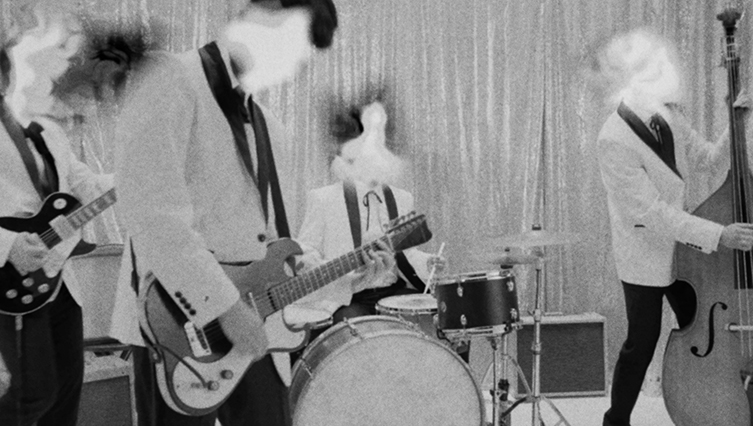
(Photo: Anthony Wilson)
Mythical Americana
GG: Amazing! So, every time I’ve been thinking of the correct way to talk about your record to you, the phrase ‘mythical Americana’ comes to mind. Does that resonate with you? For someone who’s British, your album sounds like what my foreigner’s idea of ‘American’ is.
BS: Yeah, I think that’s right on. And I think, to me, the idea of mythology and America extends...it’s very broad, because you know, for me, that encapsulates all the beautiful Native Spiritualism that we have, all the rock n roll mythology, all the film, television mythology that has built up around those industries, showbusiness. But yeah, I definitely think that...like, cowboys, all that stuff.
GG: Yeah, the frontier.
BS: The frontier, all that stuff, similar to what we were talking about before, it’s just superimposed on each other, that’s kind of the way I think about what we do. UFO’s and sasquatch: it’s all in here! (laughs)
GG: Oh yeah, yeah! Isn’t it weird that UFO’s appear all over the world, but there’s something definitely ‘American’ about the subject?
BS: (laughs) Yeah, there is, yeah! I don’t know why that is, I guess it’s because we’re a little nuts!
GG: I think you guys just talk about it more!
BS: Yeah, we’re more up for chatting about it, I think!
"If I'm strumming, I've got a '91 Gibson Dove, which is a vintage guitar now, I guess! 1991!"
GG: Well, I’m glad you like the ‘mythical American’ thing, it just seems the correct handle for it. So, in the writing process, how do you go about the task of creating a melody? Do you write lots of different versions or do you tend to go with the first one that comes?
BS: Um, it generally gets sort of honed as I write the lyrics. A lot of the time, the first time it comes out, I’ll maybe have a snippet of the lyric and it’s just kinda marble-mouth beyond that, like a melody writes itself then I fit the words in. But then, as you write the lyrics and get the message across that you wanna get across, you have to kind of adjust the melody as you go to make it fit.
But you know what? I really love simple melodies. I love just very plainsong-type stuff, but finding a way to make that fresh is a real challenge that I love. Something that I’ve been getting into, particularly in the last few years, is very economical songwriting, because when I look at the songs that touch me the most, ‘m always kind of amazed at how simple some of them are. But they still have a character of their own, even if maybe they have the same chord changes, it doesn’t seem like it, because they’ve been employed in some new way. Even production can change the complete character of a song, just by producing it a different way, or playing it on a different instrument. So, I’m really interested in that, and trying to keep a song short and simple but still have this undeniable impact on people. That’s what I’m striving for because that’s the stuff I love.

GG: Yeah! As a musician, it’s almost easier, after a certain point, to be complicated rather than simple.
BS: Yeah.
GG: You can kinda hide behind technique to a degree, but there’s something potent about those simple songs: everybody knows that melody that will break their heart a little bit, and that’s where the gold lies.
BS: Yeah, I think so too. And the straightest line to that is hard to find, sometimes, but yeah, everything I’ve made is to try to recreate that feeling that I’ve had from other music.
GG: Yeah! Pass it on!
BS: Pass it on, exactly.
GG: Do you think, as a songwriter, you have to give yourself permission to say, ‘yes, I understand that people have heard C, F and G before, but this C, F and G with this melody is doing something for me, therefore it’s valid and I should go with it’?
BS: Yeah, I think so! I absolutely think so. I’m just, you know, a big believer in lyrics. I know some people don’t pay much mind to lyrics – which is totally fine – but for me, that’s enough to make a song different. It can be the same chord changes, if it has the right lyric, it can be a whole new thing that’s completely different. And like I said before: that musical shorthand, that people have been employing since time immemorial, is really useful. There’s nothing like using a simple chord progression that people have heard before because you get that extra bit of emotional baggage that they already associate with it.
"I really love simple melodies. I love just very plainsong-type stuff, but finding a way to make that fresh is a real challenge that I love"
GG: yeah, totally man! Only a couple more questions here, your answers so far have been great. Now, it’s important to ask Lord Huron, you had that huge hit, The Night We Met that was in the TV show 13 Reasons Why. Now, I don’t know if these numbers are correct, but I read that it’s had something like 760 million streams! That’s colossal!
BS: It’s crazy.
GG: Presumably, prior to that, you were kind of a more niche, up-and-coming band, and that song was enormous! What did that mean for you and what changed afterwards?
BS: Um, I guess I don’t know all the ways that it’s changed things for me. It’s hard to know how things would be otherwise, if that hadn’t happened. But I do know that we certainly have a certain autonomy, where the label lets us do what we wanna do and stays out of our business, and trusts us, which I think is definitely paramount for me. I don’t think I could do it if I had someone over my shoulder all the time, So, yeah: just being able to do what we want to do and having a budget available to do it is a luxury I don’t take for granted. A lot of it has to do with the success of that song and people trusting us because of that. We’re not much of a radio band, so we’ve had to rely on placements like that to be our radio, to reach people who might otherwise never hear us. I know that that song has really reached people who would never have heard of us otherwise and I hope they dig in a little more and find something valuable in the rest of the stuff that we do, too. I think once they get their heads around the world we’re trying to create, they’re into it, which is great.
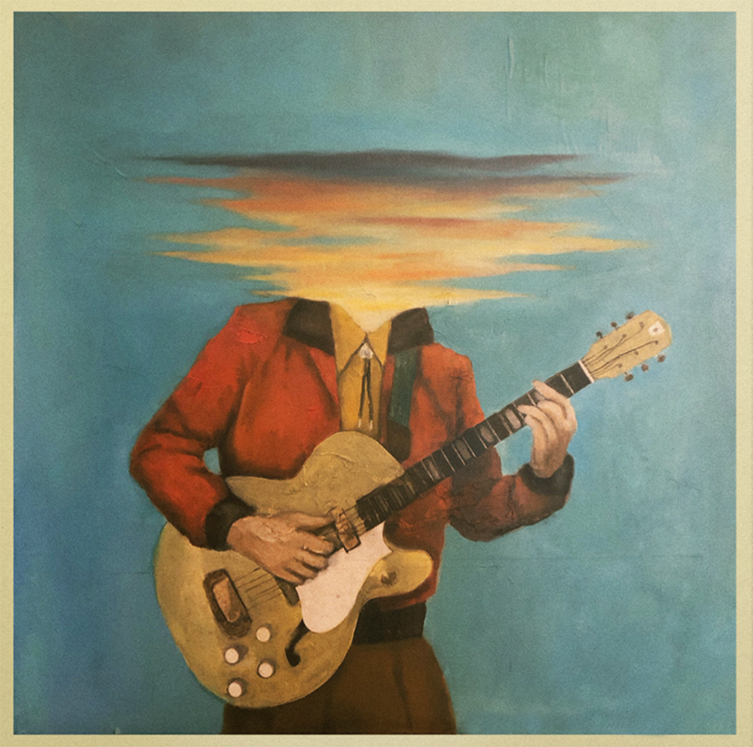
GG: Yeah, that world you’ve created, it’s a really great place to visit!
BS: Oh, thanks!
GG: So, the album’s out on May 21st and are you guys hoping to get out touring, is that the plan?
BS: Yeah, hopefully we’ll be at least doing some dates in the US here in the Fall. I think we’re working on booking something in the UK early next year, so we’ll see. We gotta wait and see how everything pans out here and over there but that’s the plan! I can’t wait to get over there, so hopefully that’ll be happening.
We hope so too! For fans of great songs and rich atmospheres, Lord Huron are hard to beat. There was so much interesting stuff to dig up there, and I had a great time chatting to Ben. Long Lost is out on May 21st, so head over to the official Lord Huron website to pre-order your copy! Thanks to Ben for taking the time out to talk to us, Ashley Matthews for setting us up and thanks most of all to you for reading our interview! We hope you enjoyed it, and invite you to read some more over on our guitarguitar interviews page.


